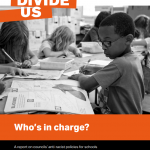DDU Academics issue open letter on the Race Equality Charter
Advance HE is a charity that offers a professional membership scheme for the higher education sector. It is funded with a combination of contributions from the UK’s main funding bodies, grants, and subscriptions from higher education institutions. It was established in 2018 from a merger of the Equality Challenge Unit, the Higher Education Academy and the Leadership for Higher Education. Its creation could be seen as symbolic of a reorientation of academia away from a traditional scholarly model to one concerned more with efficiency and social justice which, in turn, serve wider goals of organisational and ethical modernisation.
The Race Equality Charter (REC), overseen by Advance HE, is the product of its attempt to ‘do something’ about racism because, in the words of Chief Executive Alison Johns, the sector has ‘a legal and moral duty’ to do so. No one would dispute the need for universities to do something about racism, but the extent of the problem and how to oppose it are (and always have been) questions for academics to address, not for bureaucratic, partisan prescription.
Advance HE believes UK universities are structurally racist, and while Johns acknowledges that not all agree, she doesn’t engage with the opposing arguments but merely insists that ‘the evidence says otherwise.’ However, the evidence is not so straightforward. The statistics she uses to support her claim, which originate from a set of reports produced by a private company IFF Research, commissioned by the EHRC in 2019, have been questioned in a critique undertaken by academics at Don’t Divide Us. For example, Johns cites the statistical disparity between white and black student attainment of upper-second and first class degrees as evidence of race-based inequalities (86% white students versus 66.3% black students). Yet according to figures from the Higher Education Statistics Agency for 2017-18 29% of white students obtained first-class degrees compared to 13.5% of black students. In the same year 21% of Asians and 25% of mixed-race students also obtained firsts. With regards to upper-seconds, the figures are 47% white, 42% black, 44% Asian and 49% mixed-race. Whether the differences are down to institutional racism, or a variety of factors as argued in the Sewell Report (publicly dismissed by Advance HE), is open to question. The role of a university is to examine such questions critically, not declare them closed.
There is no necessary link between the differences in outcome noted and the categories Advance HE adopts to explain these differences, such as ‘whiteness’ and ‘white privilege’, which are integral to critical race theory. Once these are adopted as institutional values, the academic freedom of staff and students to contest them is curtailed – critics will find themselves literally arguing against their employer / institution. We also see Advance HE’s approach as divisive and risking the racialisation of campus life, currently having detrimental consequences in the US context.
There are a range of political and ethical approaches to racism, including that of colourblind universalism, which should be freely and critically discussed, without fear of official or informal censure. Johns protests that no-one is forcing institutions to sign up for the REC. But Advance HE should be able to publicly defend and debate the politics they affirm as orthodoxy on race and racism. Seeking and getting awards from the REC is analogous to Stonewall’s accreditation scheme, and there is ample evidence there that such accreditations are less a sign of moral virtue, and more a signal that some views are made less welcome that others. The promotion of independent, critical thought and academic freedom is the best way universities can facilitate progressive outcomes. Affirming contested ideas as institutional orthodoxy fails to do that.
We support the Cambridge academics who protested their university’s adoption of a list of microaggressions – including the raising of an eyebrow at a black student – and its invitation to report transgressors. To be accused of a micro-aggression could lead to investigations culminating in action up to dismissal at many UK universities. Advance HE advocates ‘decolonising the curriculum’ but this itself is largely a Western theoretical construct that does little or nothing to acknowledge growing scholarship within former colonies themselves which may disagree with the partisan, negative judgments of Western culture and civilization. Diversity of thought is not diversity of identity, unless we adopt the trope, itself potentially racist, that black people think the same way or relate better to ideas that come from someone with whom they share skin pigmentation or ancestry.
Don’t Divide Us have set out our critique, and suggestions for progress, more fully here.
We welcome the chance to discuss these with Advance HE and our colleagues.
Supported by the following academics:
David Abulafia FBA
Arif Ahmed
Timothy Bates
Richard Bourke
Carlton Brick
Matthew Brown (undergrad student at Edinburgh)
Jim Butcher
David Butterfield
Alka Sehgal Cuthbert
Andrew Farrall
Jane Fenton
Huayi Huang
Eric Kauffman
Marie Kawthar Daouda
Gregory Kent
Philip Kiszley
Ellie Lee
Penny Lewis
Kirsty Miller
Richard Mohun
Sebastian Monteux
Alexander Morrison
Amber Muhinyi
Cornelia van der Poll
Neil Thin
Beatrice Penati
Carole Sherwood
Robert Singh
Mark Smith
Alex Standish
Jeremy M. Sternberg
Doug Stokes
Andrew Tettenborn
Robert Tombs
Stuart Waiton
Austin Williams
James Orr


